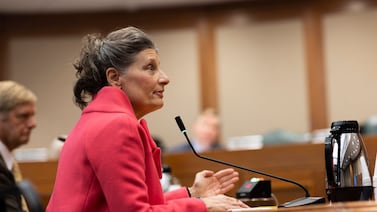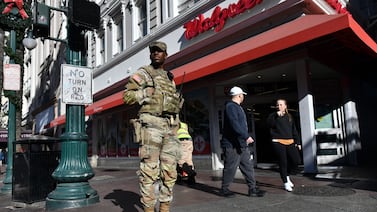Votebeat is a nonprofit news organization reporting on voting access and election administration across the U.S.
This news analysis was originally distributed in Votebeat’s free weekly newsletter. Sign up to get future editions, including the latest reporting from Votebeat bureaus and curated news from other publications, delivered to your inbox every Saturday.
President Donald Trump is promising another executive order on elections — this time to make voter ID a national requirement. Voter ID requirements have always been popular with Republicans, but now Trump is hinting at imposing one using federal power, in ways even conservatives used to reject.
Elections — I know, I know, I am repeating myself — are managed by the states, with oversight from Congress. There’s a whole clause about it in the Constitution that you can read yourself. Sure, he lacks constitutional authority over elections, but the point may not be policy alone — it’s also politics, and possibly a dangerous power grab.
Democratic leaders typically oppose voter ID requirements as an unnecessary barrier to voting, but the politics around voter ID have always been really good for Republicans. “If you persuade people that you are the party trying to make sure elections are controlled by American citizens and that Democrats are doing everything they can to make sure that illegal immigrants can vote by the busload, that’s a good position to be in,” former Texas state Rep. Todd Smith, a Republican, told me back in 2016, after he was booted from office for not writing a strict enough voter ID bill.
A Gallup poll conducted in October 2024 found that 84% of U.S. adults backed requiring a photo ID to vote. Nearly every Republican (98%) is on board, but even two-thirds of Democrats support it. It’s one of the rare voting policies with such broad bipartisan agreement.
That’s not to say it’s a simple proposition. The logistics of implementing a nationwide requirement would be messy: 36 states currently have some type of ID requirement for voters, but they vary widely on what types of IDs are accepted, for example, and what to do if a voter doesn’t have an ID. How ID requirements are enforced when it comes to mail ballots is even more confusing.
Trump’s social media posts don’t speak to the full details of the policies he plans to put in place.
As for the authority he plans to cite, that’s not clear, either. In a social media post on Aug. 18, he said that “states are merely an ‘agent’ for the Federal Government in counting and tabulating the votes. They must do what the Federal Government, as represented by the President of the United States, tells them.” That’s false, but it’s revealing.
In an interview on the Sept. 2 episode of “Washington Watch with Tony Perkins,” Cleta Mitchell, the founder of the Election Integrity Network and an advocate for citizenship checks of voters and strict restrictions on mail ballots, among other things, acknowledged that the president’s authority over elections is limited.
But she hinted at a possible path forward: The president can intervene, she said, when “there is a threat to the national sovereignty of the United States, as I think that we can establish.” She went on to say that the president could be considering exercising emergency powers “to protect the federal elections going forward.”
Since returning to office earlier this year, Trump has repeatedly issued emergency declarations to justify sweeping executive actions in other arenas — including tariffs, immigration measures, and policing the streets of large, Democratic-led American cities. He appears poised to take the same approach to elections, a space where conservatives have long warned about the threats posed by “national ID cards” and federal overreach.
Trump could normalize that, all in the name of “election integrity.”
Jessica Huseman is Votebeat’s editorial director and is based in Dallas. Contact Jessica at jhuseman@votebeat.org.



